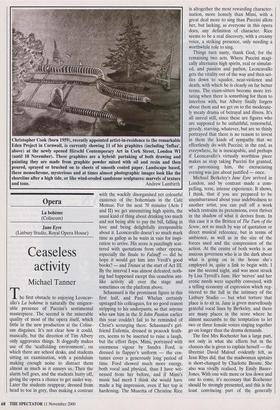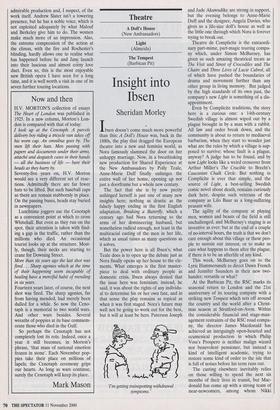Opera
La boheme (Coliseum) Jane Eyre (Linbury Studio, Royal Opera House)
Ceaseless activity
Michael Tanner
The first obstacle to enjoying Leoncav- allo's La boheme is naturally the unignor- able presence of Puccini's sentimental masterpiece. The second is the miserable quality of most of the opera itself, which little in the new production at the Colise- um disguises. It's not clear how it could, musically, but the direction of Tim Albery only aggravates things. It doggedly makes use of the 'scaffolding environment', on which there are school desks, and students sitting an examination, with a pendulum making enough noise to distract them almost as much as it annoys us. Then the alarm bell goes, and the students hurry off, giving the opera a chance to get under way. Later the students reappear, dressed from head to toe in grey, thus making a contrast with the wackily disorganised yet colourful existence of the bohemians in the Café Momus. For the next 70 minutes (Acts I and II) we get unremitting high spirits, the usual kind of thing about drinking too much and not being able to pay the bill, falling in love and being delightfully irresponsible about it. Leoncavallo doesn't so much mark time as gallop as he waits in vain for inspi- ration to arrive. His score is puzzlingly scat- tered with quotations from other operas, especially the finale to Falstaff — did he hope it would get him into Verdi's good books? — and Tristan at the start of Act III. By the interval I was almost defeated; noth- ing had happened except this ceaseless ant- like activity all over the stage and sometimes on the platform above.
Schaunard is the prominent figure in this first half, and Paul Whelan certainly upstaged his colleagues, for no good reason stripping to his underpants, so that anyone who saw him in the St John Passion earlier this year couldn't fail to be reminded of Christ's scourging there. Schaunard's girl- friend Eufemia, dressed in peacock feath- ers, seems to be inserted to raise a laugh, but the effort flops. Mimi, portrayed with enormous vigour by Sandra Ford, is dressed in flapper's uniform — the cos- tumes cover a generously long period of time. Ford showed much more energy, both vocal and physical, than I have wit- nessed from her before, and if Mimi's music had merit I think she would have made a big impression, even if her top is hardening. The Musetta of Christine Rice is altogether the most rewarding character- isation, more homely than Mimi, with a great deal more to sing than Puccini allots her, but lacking, as everyone in this opera does, any definition of character. Rice seems to be a real discovery, with a creamy voice, a striking presence, only needing a worthwhile role to sing.
Things turn nasty, thank God, for the remaining two acts. Where Puccini magi- cally alternates high spirits, real or simulat- ed, and passion and pathos, Leoncavallo gets the vitality out of the way and then set- tles down to squalor, near-violence and death, with which he is clearly on far better terms. The exam-sitters become more irri- tating when there is something for them to interfere with, but Albery finally forgets about them and we get on to the moderate- ly meaty drama of betrayal and illness. It's all unreal still, since these are figures who are supposed to be unfaithful, remorseful, greedy, starving, whatever, but are so thinly portrayed that there is no reason to invest in them the kinds of sympathy that we effortlessly do with Puccini; in the end, as everywhere, he is inescapable, and perhaps if Leoncavallo's virtually worthless piece makes us stop taking Puccini for granted, or patronising him, the excruciating evening was just about justified — once.
Michael Berkeley's Jane Eyre arrived in London, and by contrast made a com- pelling, terse, intense experience. It shows, I think, that if you are prepared to be unembarrassed about your indebtedness to another artist, you can pull off a work which restrains its pretensions, even thrives in the shadow of what it derives from. In this case it is the Britten of The Turn of the Screw, not so much by way of quotation or direct musical reference, but in terms of ambience, as well as in the size of the forces used and the compression of the action. At the centre of both works is an anxious governess who is in the dark about what is going on in the house she's employed in, quite a link to begin with. I saw the second night, and was most struck by Lisa Tyrrell's Jane. Her 'nerves' and her erotic needs were superbly conveyed, with a telling economy of expression which reg- istered to the full in the intimacy of the Linbury Studio — but what torture that place is to sit in. Jane is given marvelously grateful vocal lines by Berkeley, and there are many places in the score where he almost succumbs to the temptation to let two or three female voices singing together go on longer than the drama demands.
The first Mrs Rochester has a large part, not only in what she effects but in the chances she is given to explain herself — the librettist David Malouf evidently felt, as Jean Rhys did, that the madwoman upstairs is short-changed by Charlotte Bronte. She also was vividly realised, by Emily Bauer- Jones. With one wife more or less down and one to come, it's necessary that Rochester should be strongly presented, and this is the least convincing part of the generally admirable production and, I suspect, of the work itself. Andrew Slater isn't a towering presence, but he has a noble voice, which is not exploited adequately by what Malouf and Berkeley give him to do. The women make much more of an impression. Also, the extreme compression of the action at the climax, with the fire and Rochester's blinding, hardly allows one to realise what has happened before he and Jane launch into their luscious and almost corny love duet. Even so, this is the most enjoyable new British opera I have seen for a long time, and it is well worth a visit in one of its seven further touring locations.



























































































 Previous page
Previous page